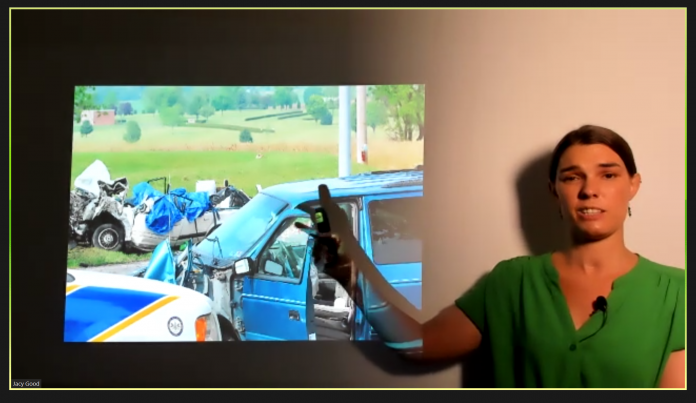May 18, 2008 was supposed to be one of the best days of Jacy Good’s life.
Her parents and brother proudly watched as she graduated from Muhlenberg College in Allentown, a bright future ahead of her. Afterward, they helped Good pack up her dorm room for the last time and embarked on the 90-minute journey home to Lancaster, Good and her parents in one car, her older brother in the other. It was an “easy” drive they had all made countless times.
Along the way, they stopped at a gas station. While this may not seem like an important detail in the grand scheme of the day, this pit stop changed the trajectory of the family’s lives forever.
In one moment, Good was in the front passenger seat as her dad resumed the trip back to Lancaster. The next, Good was waking up at Reading Trauma Hospital confused and in pain. Her brother informed her that two months had passed since her graduation, and both of their parents were killed in a car accident. That gas station was the last thing she remembered.
Good recounted this traumatic experience during TMA Bucks’ recent annual meeting, which was held virtually.
“My parents and I never made it home,” she told attendees.
She reflected on how doctors gave her a 10 percent chance of living through her first night in the hospital. Her feet and legs were broken, her lungs collapsed and she had a traumatic brain injury. However, Good began to gain strength. As she did, she had questions about what happened and why.
During a Google search of her own name, she learned that her father’s car and a semi truck were coming from opposite directions and were set to pass each other at a green light. At the intersection, waiting at a red light, was a young man talking to someone via speakerphone. Not paying attention, he made a left turn while his light was still red, forcing the truck to swerve directly into the Goods’ car.
The full force of the truck hit Good’s father, who never had a chance at survival. Her mother, on the other hand, was sitting in the back of the car. According to Good, she had the best chance at living through the incident. But she wasn’t wearing a seatbelt and had no pulse when paramedics arrived. Though Good was in the front passenger seat and closer to the impact, she was wearing her seatbelt.
“A lot of things came together perfectly to get me out of that pile of metal,” she said. “Somebody needs to be telling this story because this story happens every single day.”

When Good returned to her childhood home, the reality of what happened truly hit her. Mom and Dad would no longer sleep in their bedroom. Good’s brother had to plan funerals for his parents as his sister lay in a coma. He had to call his grandparents to tell them their children were dead. That Monday, 300 eighth-graders would learn that Mrs. Good wasn’t coming back to teach them.
Good conducted research and learned some striking facts about distracted driving. Despite someone having their eyes on the road and hands on the wheel, there’s 40 percent less brain activity dedicated to the road while talking on the phone, even via speaker or Bluetooth.
“Our brains don’t multitask,” Good said. “We look but don’t process.”
In 2008, there were no laws in Pennsylvania about cellphones and driving. Good set out to change that by traveling to Harrisburg, where she fought to get a bill passed. While it didn’t go through, her advocacy caught the attention of Oprah, who told Good that hearing her heart-wrenching story would get people to change their behavior more so than the strongest laws.
Ever since, Good has shared her harrowing experience at over 1,000 events spanning three countries.
Still, 15 people continue to be killed daily because of distracted driving incidents, which have a ripple effect on hundreds of loved ones. Meanwhile, over 1,000 are injured, including Good. Her brain injury prevents her from moving the left side of her body. She can no longer run or ride a bike. But she’s grateful to be able to shower and get dressed independently, and live a somewhat normal life. Good also married her college sweetheart, whom she dated all four years at Muhlenberg.
Good hopes her story resonates with people and urges them to put the phone away before hitting the road.
“We get an opportunity every single time we sit down in the car to make a difference,” she said.
Steve Noll, executive director of TMA Bucks, plans to have his teenage daughter, who is about to learn how to drive, watch a recording of the meeting.
In addition to Good’s keynote address, the meeting featured highlights of TMA Bucks’ work over the past year. It hosted the annual Teen Driver Safety Video PSA Challenge powered by Comcast, which was won by Pennsbury High School; launched an online telecommuting guide that was downloaded 1,400 times by businesses new to working-from-home; became the Bike Coalition of Greater Philadelphia’s official Bucks County advocate; and began management of the Bucks County Community Traffic Safety Program.
Noll said he hopes next year’s meeting is once again in-person. He also announced that TMA Bucks’ headquarters at 7 Neshaminy Interplex Drive in Feasterville will reopen to the public in September. Updates and more information can be found at tmabucks.com.
Samantha Bambino can be reached at [email protected]


